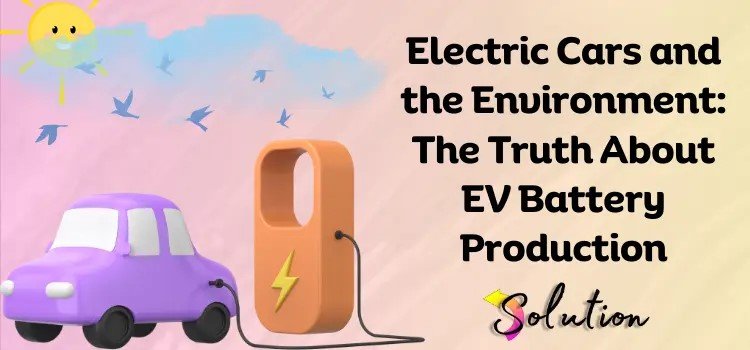Introduction
Electric vehicles (EVs) are often hailed as the future of sustainable transportation, offering a cleaner alternative to gasoline-powered cars. However, concerns surrounding EV battery production—from environmental impact to ethical sourcing—have raised questions about how truly “green” EVs are.
In this article, we will explore The Truth About EV Battery Production, examining the environmental, social, and economic aspects. We’ll also discuss innovations that aim to make battery production more sustainable and responsible.
Understanding EV Battery Composition
The heart of any electric vehicle is its lithium-ion battery, which provides the energy required to power the vehicle. These batteries are made of several critical materials, including:
- Lithium – Essential for energy storage and efficiency.
- Cobalt – Improves battery longevity but is controversial due to mining ethics.
- Nickel – Enhances battery energy density.
- Graphite – Used as the anode material for storing and releasing energy.
While these materials enable high-performance EVs, their extraction and refinement raise environmental and ethical concerns.
The Environmental Impact of EV Battery Production
1. Mining and Resource Extraction
The production of lithium-ion batteries requires large-scale mining operations, which have notable environmental consequences:
- Lithium Extraction:
- Mostly extracted in South America (Chile, Argentina, Bolivia) and Australia.
- Requires large amounts of water, leading to water shortages and ecosystem damage in lithium-rich regions.
- Lithium mining in Chile’s Atacama Desert has caused severe water depletion, affecting local communities.
- Cobalt Mining:
- Primarily sourced from the Democratic Republic of the Congo (DRC), where child labor and unsafe working conditions are widespread.
- Toxic waste from cobalt mining can contaminate water supplies and soil, impacting local biodiversity.
- Nickel and Graphite Mining:
- Nickel extraction emits significant carbon dioxide (CO₂) and can lead to deforestation.
- Graphite mining, mostly done in China, produces dust pollution that affects air quality and nearby communities.
2. Carbon Footprint of Battery Manufacturing
Despite their eco-friendly reputation, EV batteries require energy-intensive production processes. Some key concerns include:
- High Energy Consumption: The battery manufacturing process is carbon-intensive, primarily if powered by fossil fuel-based energy grids.
- Manufacturing Emissions: The production of a single EV battery can generate between 3 to 16 tons of CO₂, depending on the energy source used in factories.
- Supply Chain Emissions: Transporting raw materials and processed components across the globe adds further carbon footprint to battery production.
3. Battery Waste and Recycling Challenges
End-of-life batteries pose a major environmental challenge due to improper disposal and lack of recycling infrastructure. Some issues include:
- Toxic Waste: If not recycled, lithium-ion batteries can leach harmful chemicals into landfills, contaminating soil and water.
- Inefficient Recycling: Current battery recycling rates are below 5%, meaning most used batteries are not being repurposed.
- Recycling Complexities: Extracting lithium, cobalt, and nickel from used batteries is costly and requires advanced technology that is not yet widely available.
Ethical and Social Concerns in EV Battery Production
1. Human Rights Issues in Mining
The demand for cobalt and lithium has led to unethical labor practices in certain regions:
- Child Labor: Reports indicate that over 40,000 children are working in Congolese cobalt mines under hazardous conditions.
- Poor Worker Safety: Many miners operate in unregulated and unsafe environments, leading to injuries and fatalities.
2. Supply Chain Transparency Issues
EV manufacturers rely on a global network of suppliers, making it difficult to ensure ethical sourcing. Many companies are now investing in traceability solutions, such as:
- Blockchain technology to track raw material origins.
- Fair trade mining initiatives to ensure ethical labor conditions.
Innovations Making EV Batteries More Sustainable
Despite the challenges, advancements in battery technology and sustainable production methods offer hope for a cleaner EV future.
1. Next-Generation Battery Materials
To reduce reliance on lithium, cobalt, and nickel, researchers are exploring alternative materials, such as:
- Sodium-ion Batteries: A more abundant and less environmentally damaging alternative to lithium-ion batteries.
- Solid-State Batteries: Offer higher energy density, improved safety, and longer lifespan without relying heavily on cobalt.
- Silicon Anodes: Replace graphite anodes, improving battery efficiency and reducing carbon footprint.
2. Recycling and Second-Life Applications
Companies and researchers are developing better battery recycling processes to reduce waste and recover valuable materials:
- Hydrometallurgical Recycling: A chemical process that extracts lithium, nickel, and cobalt for reuse.
- Second-Life Batteries: Used EV batteries can be repurposed for grid storage, renewable energy storage, or backup power.
3. Green Manufacturing Practices
To lower emissions during battery production, manufacturers are:
- Using Renewable Energy: Some battery factories, like Tesla’s Gigafactories, are powered by solar and wind energy.
- Developing Local Supply Chains: Reducing emissions from material transportation.
- Implementing Closed-Loop Recycling: Companies like Redwood Materials and Li-Cycle are working on 100% battery recycling solutions.
Are EVs Still Better Than Gasoline Cars?
While EV battery production has environmental and ethical challenges, electric vehicles still have a lower lifetime carbon footprint than gasoline cars. Studies show that:
- EVs emit 50-70% less CO₂ over their lifetime compared to internal combustion engine (ICE) vehicles.
- Battery advancements and clean energy integration will continue to reduce EV emissions.
- Policies and regulations are pushing manufacturers to improve battery recycling and ethical sourcing.
What Can Consumers Do?
- Support Ethical Brands: Choose EV manufacturers that invest in responsible mining and recycling.
- Advocate for Better Recycling: Encourage governments to improve battery recycling infrastructure.
- Extend Battery Lifespan: Proper charging habits and maintenance can prolong the life of an EV battery, reducing waste.
Conclusion
The truth about EV battery production is that it comes with environmental and ethical challenges, but ongoing technological advancements and sustainable practices are improving the industry. While EVs are not a perfect solution, they remain a crucial step toward a cleaner transportation future.
